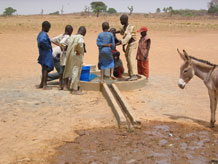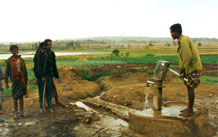BGS international work
This one-year DFID-funded research project aimed to improve the understanding of the resilience of African groundwater to climate change and links to livelihoods.
This is an area of science that has been under-researched, but has much relevance for the formulation of climate adaptation policies; see project background.
Groundwater provides most of the domestic water in rural Africa and supports poverty reduction through irrigation.
Reliance on groundwater is likely to increase as rainfall becomes more variable and demand for water becomes greater.
Download the Final Report
- Download a summary of the project results in the Final Report
Download the maps
Project objectives
The aim of the project was to improve understanding of the impacts of climate change on groundwater resources and local demand; there were three key objectives:
- To strengthen the evidence base linking climate change, climate variability, aquifer resilience and livelihood vulnerability.
- To support local and international research agendas and programmes, including the ability to collect and interpret data, and transform data into policy-relevant information and knowledge.
- To develop evidence-based guidance on assessing how groundwater can support adaptation and build resilience to climate change.
Project team
The BGS-led project team brought together UK researchers from BGS, ODI and UCL with African research institutions in Nigeria, Tanzania and Ethiopia. This interdisciplinary project team encompassed skills in international water resources, water policy and governance and water supply.
A steering group, comprising senior academics, representatives from the donor community and users, provided guidance to the project team to ensure appropriate and high quality outputs were provided to the policy community.
Project outcomes
There are several outcomes and outputs from this research:
A series of quantitative groundwater maps for Africa
The first of their kind, the maps indicate the wide variation in groundwater resources across the continent. For much of Africa, carefully sited and constructed boreholes will be able to sustain rural handpumps.
The potential for shallow boreholes yielding greater than 5 l/s is not widespread across Africa, although smaller yields of 0.5 to 5 l/s will be easier to find.
Large groundwater stores in the major sedimentary basins, which can accommodate high-yielding boreholes, are often far from population centres and associated with deep water-levels.
New data from focused groundwater case studies
Three case studies were undertaken to gather new data on groundwater and climate change in Africa:

Rural water supplies case study —
West Africa:
Detailed sampling in West Africa from hand-pumped boreholes abstracting shallow (<50 m deep) groundwater indicates significant resilience to climate variability across the range of climate zones sampled (mean annual rainfall 400–2000 mm).
The mean residence of groundwater in shallow aquifers was approximately 20–70 years and therefore well buffered against short term variations in climate.

High yielding groundwater supplies case study — Uganda and Tanzania:
A study of higher yielding supplies from crystalline basement rocks in Uganda and Tanzania indicates that sustainable larger supplies are often associated with a thick regolith (often including alluvium) over weathered basement rocks, and that yields of >1 l/s may be available in approximately 35% of effectively sited boreholes in these areas.

Access to improved water supplies and wealth case study — Ethiopia:
Detailed analysis of data on water use in Ethiopia found that both wealth and the seasonality of water access are important drivers of domestic and productive water use, probably due to higher collection times in the dry season and the labour shortages faced by poor households.
Why is this research important?
The research that groundwater possesses a high resilience to climate change in Africa and should be central to adaptation strategies.
Increasing access to improved groundwater sources based on handpumps is likely to be highly successful.
However, building strategies that depend on the availability of widespread higher reliable yields from groundwater is likely to be problematic.
Contact
Contact Dr Alan MacDonald, Project Leader, for further information
-
Error processing SSI file







